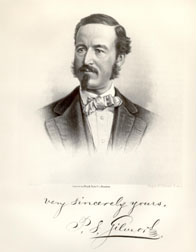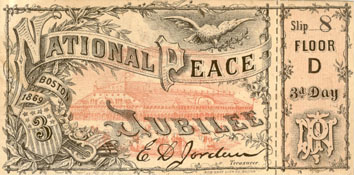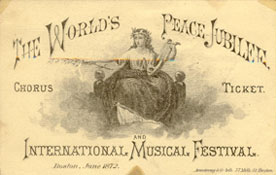Exhibit Highlights
burns library
Patrick Sarsfield Gilmore, 1829-1892: Father of the American Concert Band
Original Exhibit Fall 2004
Featuring photographs, memorabilia, programs, and text from the Michael Cummings Collection of P.S. Gilmore, the exhibit emphasizes Gilmore's role as bandmaster and organizer of the 1869 National Peace Jubilee and the 1872 World Peace Jubilee.
Beyond his accomplishments as bandleader and concert organizer, P.S. Gilmore was also a successful composer. One of his Civil War songs, "When Johnny Comes Marching Home," first appeared as part of The Soldier's Return March and was later published separately under the pen name Louis Lambert. From the 1850s to the 1870s, Gilmore conducted some of the finest bands in the Boston area, including the Boston Brigade Band and the Salem Brass Band. Gilmore and his band established a yearly Fourth of July concert on the Boston Common, and created a summer promenade concert series for the city. Two of Gilmore's grandest accomplishments came in 1869 and 1872, when he organized the National Peace Jubilee and the World Peace Jubilee. |
Highlights from the festival included a performance of Verdi's Il Trovatore, which included 100 Boston firemen striking anvils, a battery of cannon, chimes, church bells, a huge bass drum 8 feet in diameter, and a gigantic organ specially built for the occasion. |
For this 18-day festival celebrating the end of the Franco-Prussian War, Gilmore gathered 20,000 choral performers, 2,000 instrumentalists, and such internationally famous organizations as Johann Strauss and his orchestra from Austria, the Grenadier Guards Band of England, the Garde Republicaine of France, and the Prussian band of Kaiser Franz Grenadiers. From 1873 to his death in 1892, Gilmore conducted the 22nd New York Regiment Band, helping it become the foremost professional band in the United States. His funeral in New York was a grand affair, with a 100 piece marching band, a detail of 16 soldiers from New York's 22nd Regiment, and a route, as described by a New York Times obituary, "thronged with people gathered to pay the only tribute in their power to the beloved musician." |
For Further Study: Please contact the Burns Library Irish Music Center at imc@bc.edu or 617-552-3956. The Patrick S. Gilmore Society home page (maintained by the Boston Irish Tourism Association) gives an overview of Gilmore's musical career.
« back
 Patrick Sarsfield Gilmore, considered the "father of the American
concert band," was born in Ballygar, Ireland in 1829. After immigrating
to the United States in 1849, P.S. Gilmore settled in Boston, where he began
his long and illustrious career as one of America's foremost bandleaders
and concert organizers.
Patrick Sarsfield Gilmore, considered the "father of the American
concert band," was born in Ballygar, Ireland in 1829. After immigrating
to the United States in 1849, P.S. Gilmore settled in Boston, where he began
his long and illustrious career as one of America's foremost bandleaders
and concert organizers.  Gilmore organized the National Peace Jubilee in 1869 to benefit the war
widows and orphans of the Civil War, and to celebrate the peace of war's
end. A coliseum was specially built in Boston for the jubilee, with seating
for 30,000 audience members, 10,000 chorus members, and a 1,000 piece orchestra.
The coliseum was by far the largest structure of its kind in the city.
Gilmore organized the National Peace Jubilee in 1869 to benefit the war
widows and orphans of the Civil War, and to celebrate the peace of war's
end. A coliseum was specially built in Boston for the jubilee, with seating
for 30,000 audience members, 10,000 chorus members, and a 1,000 piece orchestra.
The coliseum was by far the largest structure of its kind in the city.
 Almost
immediately after the end of the National Jubilee, Gilmore began
planning for an even grander and more massive event, the World Peace
Jubilee of 1872. Once again, a coliseum was designed and built
especially for the event. Unfortunately the coliseum collapsed during
construction, and a larger version of the 1869 coliseum was hurriedly
erected in its place. Despite this setback, the Jubilee opened as
scheduled in Boston on June 17, 1872.
Almost
immediately after the end of the National Jubilee, Gilmore began
planning for an even grander and more massive event, the World Peace
Jubilee of 1872. Once again, a coliseum was designed and built
especially for the event. Unfortunately the coliseum collapsed during
construction, and a larger version of the 1869 coliseum was hurriedly
erected in its place. Despite this setback, the Jubilee opened as
scheduled in Boston on June 17, 1872.